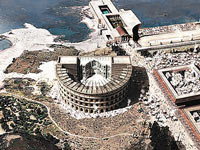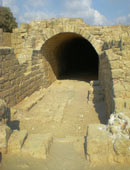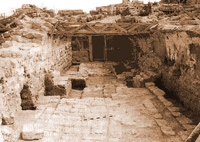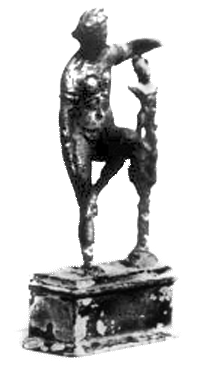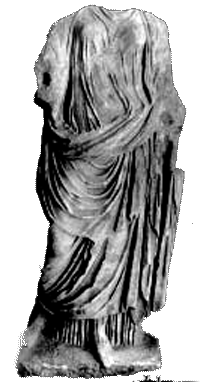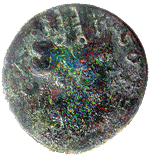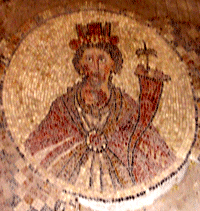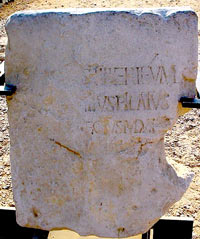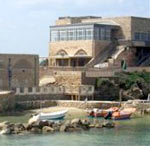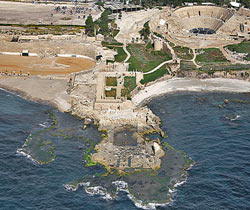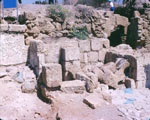Reality and the Christian dreamscape intersect in the city of Caesarea and in the persons of Felix and Festus, Roman procurators who feature both in secular history and in the fantasy called Acts of the Apostles. Neither the city nor the two men get a mention in Paul's own epistles but then the apostle would recognize little of his "life" as purported in Acts.
The author of Luke-Acts – if indeed there was a single author – made extensive borrowings from the works of Josephus and the Felix/Festus episode of "Paul's story," told through Acts 23 to 27, owes all its "authentic history" to the Jewish historian and the writings he penned in the final decades of the first century.
Strikingly, Josephus mentions all the main characters found in this episode of Acts – Felix, Festus, Agrippa, Bernice, Drusilla, Ananias – with but one exception, the apostle Paul!
Only in the Christian dreamscape are its fabricated heroes always the centre of attention.
Caesarea grows in the story
In Acts Paul passes through Caesarea with each scene change. The first occasion is shortly after his conversion. Having goaded "Hellenists" into a murderous rage with his fiery rhetoric in Jerusalem, Paul is whisked through the port on his way back to his hometown of Tarsus.
"So he went in and out among them at Jerusalem, preaching boldly in the name of the Lord. And he spoke and disputed against the Hellenists. But they were seeking to kill him. And when the brothers learned this, they brought him down to Caesarea and sent him off to Tarsus." – Acts 9.28-30.
The next occasion, many years later, is at the end of his second missionary journey: Paul "greets the local church" and returns to Antioch.
The third occasion is at the end of his third mission. This time Paul stays in Caesarea "many days", seemingly surrounded by several soothsayers. Disciples from Caesarea go with him on his fateful visit to Jerusalem.
"And when we had parted from [Ephesus] ... we arrived at Ptolemais ... we departed and came to Caesarea, and we entered the house of Philip the evangelist, who was one of the seven ... the same man had four daughters, virgins, which did prophesy. And staying for many days ... a prophet Agabus ... we got ready and went up to Jerusalem. And some of the disciples from Caesarea went with us." – Acts 21.1-16.
Paul's fateful final visit to Jerusalem (he was twice advised by the Holy Spirit, no less, not to go!) turns out to be a pivotal episode.
From this point on, we are into the "Passion of Paul." Just like the original trials of Jesus, Paul's trials are characterized by a total disregard of legal protocol, unstated, vague or trumped-up charges, Jews baying for blood, and weak, sympathetic Romans. The narration even borrows key phrases from the original.
Paul's "flight to Caesarea"
After the three failed attempts by Jews to murder Paul in Jerusalem, the clueless Roman commander, Lysias, sends Paul to Caesarea for a proper
"trial", on what will be the apostle's fourth, climatic visit to the city. The size of Paul's military escort for the journey is staggering:
"Then [the tribune] called two of the centurions and said, 'Get ready two hundred soldiers, with seventy horsemen and two hundred spearmen to go as far as Caesarea at the third hour of the night [9 pm]. Also provide mounts for Paul to ride and bring him safely to Felix the governor."
Unbelievably, four hundred and seventy two Roman soldiers are set to escorting a visiting Jewish troublemaker, a provocateur beyond doubt, and in the process leaving Jerusalem itself seriously denuded of troops! Unbelievably, the troopers trudge a record distance – and at night!
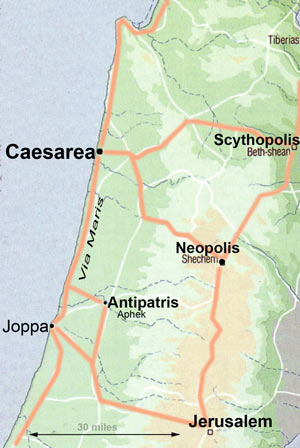 |
"So the soldiers, according to their instructions, took Paul and brought him by night to Antipatris. And on the next day they returned to the barracks, letting the horsemen go on with him." – Acts 23.32.
The journey from Jerusalem to Caesarea was about seventy-four miles along the route which passed through Aphek, an ancient Canaanite town renamed by Herod for his father Antipatris. It was said to be "150 stadia" (about 18 miles) from Joppa, though the town's exact location remains in doubt.
Thirty miles a day was about the maximum speed achievable on foot. Therefore, for Paul and his imperial escort to make the distance of forty-five miles to Antipatris in a single night – even if largely a downhill march! – is a flight of fancy.
|
|
Paul before Felix?
"On reading the letter, [the Governor] asked what province he was from. And when he learned that he was from Cilicia, he said, 'I will give you a hearing when your accusers arrive.' And he commanded him to be guarded in Herod’s praetorium." – Acts 23.34-35.
The Lord sure moves in mysterious ways! Peter was rescued from the prison of Herod Agrippa by the intercession of an angel. He passed barely a day in incarceration. Yet Paul, it seems, languished in a prison cell in Caesarea for two years. How unfair!
This episode begins with Paul arriving on horseback from Jerusalem with an entire squadron of cavalry as his escort. Having travelled the previous night at the pace of four hundred foot soldiers, presumably even on horseback Paul's party does not arrive at Caesarea until late in the day. The apostle is immediately taken before Felix, the governor, and Paul's claimed Roman citizenship gains him a hearing, "when his accusers arrive," which they do five days later. They are led by high priest Ananias, and, oddly (has the high priest lost his own voice?), an orator by the name of Tertullus* who is to present their case.
The charges
The toadying Tertullus thanks Felix for his benign governance and lists the charges against Paul: a "mover of sedition among Jews throughout the world" (even the bad guys manage to elevate the Christian hero), a ringleader of the sect of the Nazarenes, and a profaner of the temple.
Paul is invited by the procurator to respond.
Paul's defence
Paul claims that he had been gone from Caesarea only twelve days (it's actually fifteen! – so much for "Luke's great accuracy as a historian), not time enough, it seems, to agitate in temple, synagogue or city (Acts 24.12).
Paul, who in his own epistles denounces the law as a curse and a burden, now proclaims that he "believes all things written in the law and the prophets," and has offended neither God nor man. He was only in town, he says, to bring "alms and offerings to his nation" – a curious comment considering that Acts says nothing at all about this collection and ascribes Paul's visit to Jerusalem to a "resolve of the spirit" (Acts 19.21). And anyway, says Paul, the Jews can't prove a thing (where are those dastardly "Jews of Asia"?)
After these "opening statements," the case is deferred pending the arrival of Lysias from Jerusalem with "more evidence" – though in fact that never occurs. Paul remains in his "palace prison" and Lysias disappears from the story. And yet Paul's detention is far from onerous. One oddity is that he has a centurion as a personal guard. Another is that he is "at liberty" and can receive visitors – though there's no record that either Peter, Philip or any of the brethren came calling!
"And he commanded a centurion to keep Paul, and to let him have liberty, and that he should forbid none of his acquaintance to minister or come unto him." – Acts 24.23.
Once again, Romans, unlike the blood-thirsty Jews, are portrayed as remarkably well-disposed towards the Christians, and a few days later Paul begins a new role as "court tutor" in matters of divine management!
Entertaining Drusilla
"Some days later when Felix came with his wife Drusilla, who was Jewish, he sent for Paul and heard him speak concerning faith in Christ Jesus. And as he discussed justice, self-control, and the coming judgment, Felix became frightened." – Acts 24.24-25.
Bizarrely, Felix entertains his young bride with a sermon from Paul on "justice, self-control, and the coming judgment" – obviously more appealing than the "indulgence in every kind of lust" recorded by Tacitus! Even more ludicrous is the notion that the governor "trembled" at Paul's words. The idea that the iron-fisted Felix was frightened by fire and brimstone from Paul is risible. This is scarcely the killer described by Josephus!
"Felix caught and put to death many imposters, together with the robbers, every day."
– Josephus, Antiquities, 20.8.5.
Paul, we are told, was called "very often" by Felix though evidently not solely from a thirst for Christian instruction. The unscrupulous Felix also "hoped for a bribe."
"Go away for the present; when I have an opportunity, I will send for you.' At the same time he hoped that money would be given him by Paul, and for that reason he used to send for him very often and converse with him." – Acts 24.24-25.
Where on earth would Paul have kept his stash of cash, for heaven sake, under his prison mattress or at the local Wells Fargo office? And did Felix really sustain a "hope for a bribe" for two years?
This pathetic literary device is used to explain why Paul – supposedly a Roman citizen who could not be bound or held without charge – is kept in custody by the governor for such a long period of time. The "trial" itself fizzles out. At length (but in one sentence!) Porcius Festus arrives as the new procurator and (bizarrely) Felix, "to show the Jews a pleasure" leaves a bound Paul for the new man to deal with.
Seems that Paul's fire and brimstone had no effect after all!
Reality check
Trial and Error
In Acts, Paul is presented before Felix and Ananias, and yet before Felix had been appointed, high priest Ananias had been arrested by Quadratus, the imperial legate of Syria and sent in chains to Rome to "plead his case before Caesar"!
Josephus tells us quite a lot about Ananias, the son of Nebedeus (Wars 2.12, etc.). He was made high priest in the year 47 during the procuratorship of Tiberius Alexander, an apostate Jew. The following year Alexander was replaced by Ventidius Cumanus, whose appointment coincided with growing unrest in the province (the "fever of innovations").
In 52, murderous discord between Judaeans and their Samaritan neighbours precipitated the heavy-handed intervention of Cumanus. According to Josephus – a tad partisan in the matter – Cumanus accepted bribes, sided with the Samaritans and led troops of the "Augustan band" against the Jews, killing many.
"But Cumanus took one troop of horsemen, called the Troop of Sebaste [Greek 'Augustus'], out of Caesarea, and came to the assistance of those that were spoiled." – Wars, 2.12.5.
At this point, both Jews and Samaritans appealled to Quadratus. Shipped to Rome along with the arrested Ananias went Cumanus the procurator, and Celer, a Roman tribune (both of whom were punished, the former with exile, the latter with beheading). Hearing the case before emperor Claudius was the 25-year old Jewish prince Agrippa, soon after rewarded with part of the old Herodian kingdom.
It was in that same Claudian reorganization, that Marcus Antonius Felix, brother of the emperor's senior freedman, Pallas, was given the procuratorship of Judaea, a post he held from 52 to 60.
The only high priests known during the eight-year term of Felix [time-line] are Jonathan, appointed in 53 and assassinated (at the instigation of Felix) in 58, and his replacement, Ismael son of Phiabi, appointed shortly before Felix was recalled by Nero (Antiquities 20.8.8.). Even Ismael, notionally high priest until 62, in fact was held hostage in Rome after Poppea, the wife of Nero, had interceded on behalf of the Jewish priests (Antiquities 20.8.11). The priests had been in dispute with Agrippa about a wall, erected deliberately to obstruct the king's view of the temple from a new dining room at the palace.
It was about the year 54 that Felix married Drusilla, a sister of the Agrippa and at the time aged sixteen. She had already been married briefly to Azizus, king of the small kingdom of Emesa. Another sister Bernice (Berenice) would become the lover of Titus Caesar.
Several years must pass between the arrest of Ananias and the supposed trial of Paul in Caesarea. Not only does the trial have to be later than the marriage to Drusilla; words placed into the mouth of Paul have the apostle say to Felix, "I know that you have been many years a judge of this nation" (Acts 24.10).
Christian apologists favour a date for Paul's trial around the year 58 and conjecture a phantom second or regained high priestship for Ananias, having also assumed that Ananias was found innocent in Rome and had returned safely to Jerusalem. Some even conflate Ananias with the similarly named Ananas (high priest around 62/63), although the latter was clearly one of several sons of Ananas the elder and not the son of Nebedus. Even further confusion is caused by Josephus' report of the death of a "high priest Ananias" (a common enough Jewish name) in the battle for Jerusalem some few years later. But this Ananias was not the ruling high priest at that time and is a different character entirely (as Whiston, the translator of Josephus so thought.)
But the fate of the "original" Ananias is unknown. And more damning of the fable than the unworkable chronology is the undeniable truth that throughout his tenure, Felix arrested and executed agitators and rebels, both Jews and Samaritans, with ruthless determination. His delicacy with Paul is contrived and untenable – and Felix never got his bribe after all!
All of which leaves the story in Acts in shreds.
Paul before Festus, Agrippa and Bernice?
In the year 60, following the downfall of his brother Pallas in Rome, Felix was dismissed as procurator and replaced by Festus. Top priority for the new governor, at least according to the claim made in Acts, was the great apostle left bound in Caesarea. This, in a province beset by growing civil unrest.
"Festus found Judaea laid waste by the bandits ... the sicarii were by this time exceedingly numerous." – Josephus, Antiquities, 20.8.10.
Just three days after his arrival, Festus is confronted by Jewish leaders and a now conveniently unnamed high priest, pleading for Paul to be sent to Jerusalem so that they can waylay and kill him.
But why was Paul a more urgent matter than the hordes of assassins? Why on earth had the Jews not made such a request during the two years in which Paul had supposedly been held in prison by Felix?! And if it was all about a "hoped for bribe" surely the high priests could have bribed Felix of all people?!
In any event, Festus rejects the Jewish plea, deciding that he will hear the case in Caesarea, to which he returns.
Parallels to the trial of Jesus now come thick and fast.
Next day, Festus, like Pilate, sits on the judgement seat (Acts 25.6. cf Matthew 27.19/ John 19.13). With their wrath undiminished by time, the attending Jews make "many and grievous complaints against Paul which they can't prove." Paul responds with a similarly truncated defence: "I'm innocent."
Who are these Jewish accusers? Are they members of the Sanhedrin, worried silly about one imprisoned renegade in a country full of such characters? Or are they the "Jews of Asia", who have taken up residence in Judaea these past two years, hoping to get another shot at Paul? The whole story is patently absurd.
Bizarrely, having determined that he will hear the case in Caesarea and with all the necessary cast assembled there, Festus, "to please" the very Jews that he has already refused, asks Paul if he will agree to a trial in Jerusalem!
The absurdities now build to the most famous absurdity of them all: the appeal to Caesar.
"Paul answered: `I am now standing before Caesar’s court, where I ought to be tried. I have not done any wrong to the Jews, as you yourself know very well. If, however, I am guilty of doing anything deserving death, I do not refuse to die. But if the charges brought against me by these Jews are not true, no one has the right to hand me over to them. I appeal to Caesar!’ After Festus had conferred with his council, he declared: `You have appealed to Caesar. To Caesar you will go!’" – Acts 25.10-12.
 |
| Paul denounces the idea of being "handed over to the Jews" but Festus has not made any such threat. He has specifically spoken of a trial "before me" – not a Jewish court (Acts 25.9.) And just what is Paul appealling to Caesar about – nebulous charges that have already been determined as merely a matter of religion? (Acts 23.29; 25.19; 25.26-27). A verdict of not guilty? (Acts 26.32). An unlawful punishment which he hasn't received? (Acts 25.16). Since he acknowledges that he is already before Caesar's court, what can he possibly gain from the court of the capricious tyrant Nero – which, if we believe the mythology, did indeed result in his beheading! But we are not talking here of history but of theatre. |
|
The "appeal to Caesar" is pure invention, a plot device already anticipated by the very words of Jesus a few pages earlier:
"The following night the Lord stood by him and said, "Take courage, for as you have testified to the facts about me in Jerusalem, so you must testify also in Rome."
– Acts 23.11.
Paul's rather suspect Roman citizenship, suddenly disclosed to forestall a flogging, made an "appeal to Caesar" possible but the "trial" itself did not make any such appeal necessary, advantageous or rational.
In truth, not the fabricated Paul but the author of Acts has a clear political and theological motive in mind: to move his story on towards a necessary climax in Rome. This would-be capital of the faith needed the legitimizing presence of the super apostle, however inconsequential his stay would be – in the event, another uneventful two-year prison term!
Enter Agrippa
Before Paul is despatched to Rome yet a third "trial" is convened, this time before king Agrippa, who just happens to be in town. Jesus, of course, had been taken before Herod Antipas in between his two appearances before Pilate. Agrippa is keen to meet Paul (as indeed Antipas had been keen to meet Jesus (Luke 23.8).
"A few days later King Agrippa and Bernice arrived at Caesarea to pay their respects to Festus. Since they were spending many days there, Festus discussed Paul's case with the king. He said: 'There is a man here whom Felix left as a prisoner.' ... Then Agrippa said to Festus, 'I would like to hear this man myself.' He replied, 'Tomorrow you will hear him.'"– Acts 25.13-22.
How very strange that "Luke" should know what Festus and Agrippa said to each other in their private apartments! (But then "Luke" also seems to know what was said in Antipas' apartments when he questioned Jesus! Luke 23.7-11).
Present at this new hearing are the "chief captains" and principal men of the city. The Jews are baying for Paul's execution (Acts 25.24), just as they did at the trial of Jesus. Festus "washes his hands" of Paul – he MUST go to Rome.
Before Agrippa, Paul takes the opportunity to regurgitate the resume given before the "multitude" in Jerusalem. He is a good Jew, he insists, merely following Moses and the prophets. Like Jesus, the apostle is thought "mad" (Acts 26.24 cf Mark 3.21).
"I am saying nothing beyond what the prophets and Moses spoke of as about to come, that the Christ must suffer and, as the first to rise from the dead, he would proclaim light to the people and to the nations." – Acts 26.22-23.
 |
| Note that Paul makes no reference to Jesus in his defence before Agrippa. The "Christ that must suffer" merely paraphrases the notion of a "messiah suffering for the sins of the people" found in Jewish scripture. There is nothing said of a recently executed Jesus of Nazareth, nor does Paul remind the court of the portentous signs and wonders that accompanied his crucifixion. Paul says nothing of the saints that came back to life and marched into Jerusalem – surely more graphic than invoking Moses? Paul makes no request for witness testimony from the "above five hundred" who saw the resurrected Jesus, "many of whom," supposedly, "were still alive." He does not call on the testimony of any of the apostles, still actively working miracles and converting whole towns to the new faith. He does not mention the baptism of "Cornelius," apparently a centurion resident in that very city; nor does he invoke the name of James, the so-called "brother of Jesus," and now, it seems, the widely respected ("righteous") head of the church in Jerusalem. |
|
We finally enter nevernever land when Agrippa, on the basis of zero evidence and Paul's feeble logic ("good Jew equals Christian"), declares that he is "almost" persuaded to become a Christian and that "if only" Paul had not appealed to Caesar he might have been set at liberty.
With this, the stage is set for the next fantasy – a rip-roaring voyage to Rome.
End game - The Augustan Band (Cohors I Augusta)
"And when it was determined that we should sail into Italy, they delivered Paul and certain other prisoners unto one named Julius, a centurion of Augustus' band." – Acts 27.1.
One always marvels at the "authentic details" that the author of Acts slips into his fable of Christian forbearance and evangelical triumph. And yet they are so often the same authentic details that we find in the works of Josephus! It is the "Augustan band" that is to take Paul from Caesarea to Rome, the very same military unit that Josephus happens to mention in service in Samaria!
"When Cumanus heard of this action of theirs, he took the band of Sebaste [Greek 'Augustus'], with four regiments of footmen, and armed the Samaritans, and marched out against the Jews, and caught them, and slew many of them, and took a great number of them alive." – Antiquities, 20.122.
PS: Dating Paul – Province Cilicia?
"The governor read the letter and asked what province he was from. Learning that he was from Cilicia, he said, 'I will give you a hearing when your accusers arrive.' And he commanded him to be guarded in Herod’s praetorium."
– Acts 23.34.
Not where but when was there a Province of Cilicia? Not, it seems, during the century before Vespasian:
"There was an entity called 'Provincia Cilicia' in about 100 BC, but this was a provincia of the old-fashioned kind – a job, not attached to any particular piece of territory, and especially not to any part of Cilicia. That region did not come under Roman rule until Pompey's victory over the pirates [67 BC].
Soon afterwards the administration was reorganized, and Provincia Cilicia vanished from the map: it was not to reappear until Vespasian's reign in the seventies AD, this time in a more appropriate place ... Only with Vespasian ... were the last of these kinglets removed and Cilicia welded into a single political unit."
– N. Sitwell, Roman Roads in Europe, p200/1.
"Cilicia" at the time of Pompey's campaign against the pirates referred to a vast swathe of territory, including much of southern Anatolia and even the island Cyprus; as proconsul, Cicero was the last of its governors (51-50 BC). After the civil wars, Augustus divided this huge region into several provinces but left a number of marginal territories in the hands of allied princes.
In the time of Augustus, the region that would become the province of Cilicia a century later, after Vespasian's reorganization, was divided between a mountainous western region ("rough Cilicia") and a fertile ("flat") eastern region of Pedias (aka Campestris). In the Augustan settlement, Pedias was awarded to Archelaus, king of Cappadocia and when Archelaus died in 17 AD, his kingdom was revamped as the Roman province of Cappadocia. At that point, Pedias was detached and, along with its capital of Tarsus, transferred to the province of Syria.
"The Romans thought Pedias too small to make a province in its own right and treated as an appendage of Roman Syria." (Ibid)
Meanwhile, "rough Cilicia" was entrusted to various native kings, one of whom was Polemon II, third husband of Bernice during the 50s, and subsequently deserted by her. Polemon remained king of Cilicia until his death in 74 AD.
There is thus considerable doubt regarding the claim made in Acts that Paul was a native of the "province of Cilicia" – unless, of course, the writer of this 2nd century fiction was referring to his own time! The poetic license of our writer is further illustrated by the incongruous reference to the "praetorium of Herod", supposedly spoken by the Roman governor in Acts 23.34.
Sources:
Josephus, Jewish Antiquities 15; Jewish War I.
Avner Raban, Kenneth Holum, Caesarea Maritima - A Retrospective after Two Millennia (Brill, 1995)
Eusebius, The Martyrs of Palestine (Digireads, 2005)
Ehud Netzer, The Architecture of Herod, the Great Builder (Baker, 2008)
Lee I. Levine, "Roman Caesarea: An Archaeological-Topographical Study." Qedem II,
1975
M. Grant, Herod the Great (McGraw-Hill, 1971)
Jerome Murphy-O'Connor, The Holy Land (OUP, 1986)

|
 |

|

|
Some fifty articles are now available as a book.
For your copy order:

|
|
'Save'
a friend e-mail this page
Copyright © 2010 by Kenneth Humphreys.
Copying is freely permitted, provided credit is given to the author and no
material herein is sold for profit.
|


